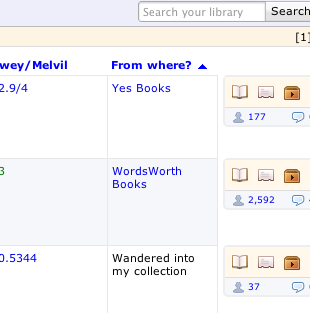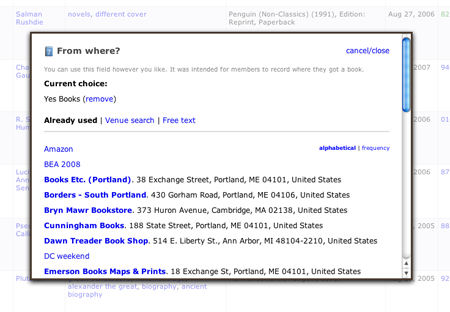Want to apply for one of the technical jobs at LibraryThing? Take the test below. If you can do it in under five minutes, let’s talk!
Background. I’ve been spending a lot of my time going through (read: “drowning in”) applications for our 2-3 open technical jobs. And I’ve been conducting a few interviews. The latter has demonstrated to me again the value of asking applicants to write code, especially simple code, during the interviews.
That interviews should involve simple code is now common wisdom in programming circles. The story is that a high percentage of programmers, even people with impressive resumes, “just can’t code.” Asked to do the simplest things—problems a good coders could solve as fast they could write—some spend ten or twenty minutes before they get an answer, or fail entirely. (See discussion by Jeff Attwood and Joel Spolsky.) I don’t go as far as others here. I think a lot of “slow coders” are probably excellent employees, making up for it in other areas. Some projects don’t need speed. Some people just need to spend more time programming; everyone was a slow programmer some time. But I know from experience that slow coders don’t work at LibraryThing. They don’t fit the LibraryThing development culture.
“Simple code” is critical. When I first started interviewing I’d ask people to solve hard problems. This didn’t work. As Spolsky’s famous “The Guerrilla Guide to Interviewing” argues, however, simple problems are just as good, or better. Simple problems test simple skills, and simple skills are the basis of complex ones. A programmer who struggles to loop through a bunch of words will be at sea performing far more complex tasks. If you can’t boil water your Toad in the Hole is likely to come out wrong.
Coding tests irritate a minority of people. One applicant said his resume should speak for itself. I have no time for that attitude—though I’m happy for the weeding help. Good programmers should welcome the opportunity to demonstrate they’re good at what they do. Heck, most programmers I know enjoy brain teasers anyway. They test themselves when no one’s looking.
The rules.
- Time yourself.
- Write this code in any language you want. Use your best language. If you can do many, PHP, Python and Javascript are preferred.
- Write it out longhand or in a simple text editor.
- I don’t care much about syntax. You can fix whether it’s isArray or is_Array later. If it has some obvious bug you’d fix in a second, fine.
- This is not a trick question.
- I’m not asking for some imaginary “best answer” that does everything in one line of self-writing code, or whatever.
The problem.
Input is a string—a paragraph of text. One of the paragraphs above would be fine.
Output is a report listing how many words there are with X letters, like:
10 words with 1 letter
20 words with 2 letters
7 words with 3 letters
15 words with 4 letters, etc.
How’d you do? Programmers employed by LibraryThing can do this in between 45 seconds and four minutes. We expect you to be in that range. If you’re applying for the sysadmin position you can be slower. (We think good sysadmins need to be able to program, but you don’t need to be a crackerjack programmer.)
If you’re in that ballpark in any language, go ahead and and apply!
UPDATE: We are NOT approving comments with the solution. We don’t want people to be exposed to it when they read this—it would defeat the purpose. We’ll approve them after the job is filled.










